PROGRAM
Speakers – IT-DEFENSE 2012 |
Further information to the speakers will follow after release.
| Prof. Dr. Gunter Dueck | |
 |
Prof. Dr. Gunter Dueck is an IBM Distinguished Engineer. Prior to joining IBM in the year 1987, he was a professor for mathematics at the University of Bielefeld, Germany. His fields of research include information theory, combinatorics, optimization, management theory. His theory of identification (invented with R. Ahlswede) won the 1990 IEEE Prize Paper Award of the IEEE Information Theory Society. Gunter Dueck worked for several years at the IBM Scientific Center as a researcher in optimization and he managed an upcoming business in this field. He founded the Business Intelligence Services (Data Warehouses, Data Mining) for IBM Central Europe. Since many years, he is working for strategic direction and cultural change. 2009 and 2010, he led the “Dynamic Infrastructure” and “Cloud Computing” business of IBM Germany. Currently he serves as CTO (Chief Technology Officer) of IBM Germany. Gunter Dueck is an IEEE Fellow, a member of the IBM Academy of Technology, and a corresponding member of the Göttingen Academy of Sciences. He authored some satiricalphilosophical books on humans, management and life (Wild Duck, E-Man, Omnisophie, Supramanie, Topothesie – on humane keeping of humans). In 2006, he published the novel Ankhaba, where vampires discover the meaning of life. The book Lean Brain Management – Success and more Efficiency by Zero-Intelligence was celebrated as “Management Book of the year 2006” by the Financial Times Germany and getAbstract. His 2007 book Abschied vom Homo Oeconomicus deals with the unreason of academic and practical economics, it was one of ten books being nominated for a “Best Book on Economics Award”. |
| Andrea Barisani | |
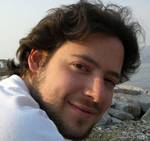 |
Andrea Barisani is an internationally known security researcher. Since owning his first Commodore-64 he has never stopped studying new technologies, developing unconventional attack vectors and exploring what makes things tick...and break. His experiences focus on large-scale infrastructure administration and defense, forensic analysis, penetration testing and software development, with more than 10 years of professional experience in security consulting. Being an active member of the international Open Source and security community he contributed to several projects, books and open standards. He is now the founder and coordinator of the oCERT effort, the Open Source Computer Emergency Response Team. He has been a speaker and trainer at BlackHat, CanSecWest, DEFCON, Hack In The Box, PacSec conferences among many others, speaking about TEMPEST attacks, SatNav hacking, 0-days, OS hardening and many other topics. |
| Daniele Bianco | |
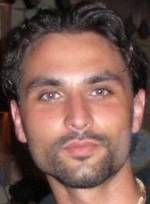 |
Daniele Bianco began his professional career as a system administrator in scientific organizations. His interest in centralized management and software integration in Open Source environments has focused his work on design and development of suitable R&D infrastructures. One of his passions has always been exploring hardware and electronic devices. Currently he is Inverse Path's resident Hardware Hacker. His primary activities focus on hardware customization, embedded system integration and the design of remote monitoring networks for M2M infrastructures. He is an active contributor to the Open Source community and an invited speaker at many international IT security events. |
| Prof. Dr. Thomas Hoeren | |
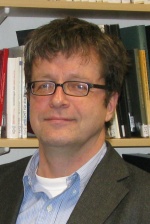 |
Born in Dinslaken on August 22, 1961. 1980 – 1987 theology and law studies in Münster, Tübingen and London. 1986 Church licentiate degree in theology. 1987 First State Examination in Law, 1991 Second State Examination in Law. 1989 Doctorate at the University of Münster (title of dissertation: „Software Licensing as a Product Purchase“). 1994 Habilitation at the University of Münster (title of habilitation: „Self-regulation in Bank and Insurance Law). 1995 – 1997 Professor at the Law Faculty of the Heinrich-Heine University Düsseldorf (Professorship for Civil Law and International Business Law). Since April 1996 "Judge at the Court of Appeal (Oberlandesgericht) Düsseldorf. Since April 1997 Professor at the Law Faculty of the Westfälische Wilhelms-University Münster (Pro-fessor of IT Law and Legal Informatics) and Managing Director of the Institute for Information, Telecommunication and Media Law (ITM). Focus of research: IT law, legal informatics, bank and insurance law, competition and anti-trust law, international business law. Co-editor of the journals „Law, Computers and Artificial Intelligence“, „EDI-Law Review“ and „MultiMedia and Law“. Legal Adviser to the European Commission/DG XIII on the „Legal Advisory Board on Information Technology“. Member of the Task Force Group on Intellectual Property of the European Commission. Since June 2000 WIPO 2000, Domain Name Panelist. Member of the Communication Committee of the German UNESCO Commission. 2004 Research Fellow at the Oxford Internet Institute/Balliol College. Lecturer at the Academy of Art Münster, focusing on copyright law and art trade law. Lecturer on Infor-mation and IT law at the Universities of Zurich and Vienna. Member of the Kulturrat Münsterland. 2005 honored with the ALCATEL-SEL Research Award „Technical Communication“. Mem-ber of the Technical Committee for Copyright and Publishing Law of the German Associa-tion for Intellectual Property and Copyright Protection. Since 2006 Liaison lecturer at the Studienstiftung des Deutschen Volkes. Married, two children. |
| Mikko Hypponen | |
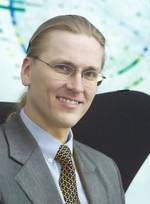 |
Mikko Hypponen is the Chief Research Officer for F-Secure. He has worked with F-Secure in Finland since 1991. Mr. Hypponen has led his team through the largest outbreaks in history. His team took down the world-wide network used by the Sobig.F worm. He was the first to warn the world about the Sasser outbreak, he named the infamous Storm Worm and he has done classified briefings on the operation of the Stuxnet worm. Mr. Hypponen has assisted law enforcement in USA, Europe and Asia on cybercrime cases. He has written for magazines such as Scientific American and Foreign Policy and for newspapers like The New York Times. Mr. Hypponen has addressed the most important security-related conferences worldwide. He is also an inventor for several patents, including US patent 6,577,920 "Computer virus screening". He has been the subject of dozens of interviews in global TV and print media, including a 9-page profile in Vanity Fair. Mr. Hypponen, born in 1969, was selected among the 50 most important people on the web by the PC World magazine. He also received the Virus Bulletin Award, awarded every ten years, as "Best in industry". Apart from computer security issues, Mr. Hypponen enjoys collecting and restoring classic arcade video games and pinball machines from past decades. |
| Bruce Schneier | |
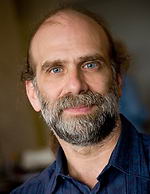 |
Bruce Schneier is an internationally renowned security technologist and author. Described by The Economist as a "security guru," he is best known as a refreshingly candid and lucid security critic and commentator. When people want to know how security really works, they turn to Schneier. His first bestseller, Applied Cryptography, explained how the arcane science of secret codes actually works, and was described by Wired as "the book the National Security Agency wanted never to be published." His book on computer and network security, Secrets and Lies, was called by Fortune "[a] jewel box of little surprises you can actually use." Beyond Fear tackles the problems of security from the small to the large: personal safety, crime, corporate security, national security. His current book, Schneier on Security, offers insight into everything from the risk of identity theft (vastly overrated) to the long-range security threat of unchecked presidential power and the surprisingly simple way to tamper-proof elections. Regularly quoted in the media -- and subject of an Internet meme -- he has testified on security before the United States Congress on several occasions and has written articles and op eds for many major publications, including The New York Times, The Guardian, Forbes, Wired, Nature, The Bulletin of the Atomic Scientists, The Sydney Morning Herald, The Boston Globe, The San Francisco Chronicle, and The Washington Post. Schneier also publishes a free monthly newsletter, Crypto-Gram, with over 150,000 readers. In its ten years of regular publication, Crypto-Gram has become one of the most widely read forums for free-wheeling discussions, pointed critiques, and serious debate about security. As head curmudgeon at the table, Schneier explains, debunks, and draws lessons from security stories that make the news. |
| Michael Ossmann | |
 |
Michael Ossmann is a wireless security researcher who has been obsessed with Bluetooth for the past three years. Michael founded Great Scott Gadgets in an effort to put exciting, new tools into the hands of innovative people. |
| Timo Kasper | |
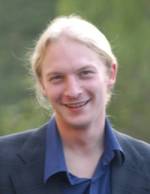 |
Timo Kasper, born 1979 in Bochum, conducts research on embedded security and is an expert in security analysis of embedded cryptographic systems, especially RFID and wireless applications. He studied electrical engineering and information technology at the Ruhr-University Bochum and at the University of Sheffield, Great Britain. In 2006, his thesis “Embedded Security Analysis of RFID Devices“ won the first place-award for IT security (CAST, Darmstadt). Timo Kasper has been research associate at the Chair of Embedded Security at the Horst Görtz Institute for IT Security at the Ruhr-University Bochum since October 2006. His hardware-oriented research covers implementation attacks (side-channel analysis, error injection), protocol attacks and security reviews at system level. As a result of practical analysis and penetration tests successful attacks can target various commercial, wireless systems: for example, the “KeeLoq” access control system can be bypassed and thus doors opened without authorization; money can be loaded on wireless cash payment system cards and fraudulent payments made; and the secret key of cryptographically secure, wireless smart cards can also be extracted using advanced physical attacks. Timo Kasper has several years of experience as a speaker at international scientific conferences and in the industry as well as a lecturer at universities. |
| Justine Osborne | |
 |
Justine Osborne is a Senior Security Consultant for iSEC Partners, an information security organization. At iSEC, Justine specializes in application security, focusing on web application penetration testing, code review, and secure coding guidelines. She also performs independent security research, and has presented at security conferences such as Blackhat, Defcon, DeepSec and SysScan. Her research interests include emerging web application technologies, dynamic vulnerability assessment tools, Rich Internet Applications (RIA), and mobile device security. |
| Jana Diesner | |
 |
Jana Diesner is an Assistant Professor at the Illinois at Urbana-Champaign, Graduate School of Library and Information Science, and a PhD candidate at Carnegie Mellon University, School of Computer Science. With her work at the intersection of machine learning, natural language processing and network analysis she advances methods and technologies for understanding the interplay of information flow and the functioning of socio-technical networks. In her empirical work, Jana studies networks from the business, science and geopolitical domain. She is particularly interested in covert information and covert networks. More information at http://www.janadiesner.com. |
| Dr. Christoph Wegener | |
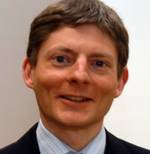 |
Dr. Christoph Wegener (CISA, CISM, CRISC) has a doctorate in physics and has freelanced with wecon.it-consulting in IT security, data security and OpenSource since 1999. He is the author of many articles, lector and accordingly reviewer, a member of several program committees, a member of the advisory board of the magazine “Datenschutz und Datensicherheit” (DuD) and aktiv in education in IT Security. Since 2005 Mr. Wegener has also worked for the European Competence Center for Information Technology Security (eurobits) in Bochum. Moreover, he is a founding member and board member of the work group Identity Protection on the Internet (a-i3) and of the German Chapter from the Cloud Security Alliance (CSA) and also a board member of the German Unix User Group (GUUG). Mr. Wegener is a “Certified Information Systems Auditor” (CISA), "Certified Information Security Manager" (CISM), "Certified in Risk and Information Systems Control" (CRISC), owner of the "Certificate of Cloud Security Knowledge" (CCSK) the Cloud Security Alliance as well as GDD- and TÜV-certified data security officer (GDDcert/DSB TÜV). |
| Kevin Mitnick | |
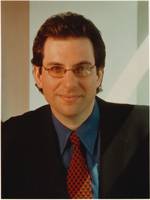 |
With more than twenty-five years of experience in exploring computer security, Kevin Mitnick is a largely self-taught expert in exposing the vulnerabilities of complex operating systems and telecommunications devices. His hobby as an adolescent consisted of studying methods, tactics, and strategies used to circumvent computer security, and to learn more about how computer systems and telecommunication systems work. In building this body of knowledge, Kevin gained unauthorized access to computer systems at some of the largest corporations on the planet and penetrated some of the most resilient computer systems ever developed. He has used both technical and non-technical means to obtain the source code to various operating systems and telecommunications devices to study their vulnerabilities and their inner workings. As the world’s most famous (former) hacker, Kevin has been the subject of countless news and magazine articles published throughout the world. He has made guest appearances on numerous television and radio programs, offering expert commentary on issues related to information security. In addition to appearing on local network news programs, he has made appearances on 60 Minutes, The Learning Channel, Tech TV’s Screen Savers, Court TV, Good Morning America, CNN’s Burden of Proof, Street Sweep, and Talkback Live, National Public Radio, and as a guest star on ABC’s spy drama “Alias”. Mitnick has served as a keynote speaker at numerous industry events, hosted a weekly talk radio show on KFI AM 640 in Los Angeles, testified before the United States Senate, written for Harvard Business Review and spoken for Harvard Law School. His first best-selling book, The Art of Deception, was published in October 2002 by Wiley and Sons Publishers. His second title, The Art of Intrusion, was released in February 2005. Mr. Mitnick’s autobiography was released in August 2011 and is a New York Times bestseller. |
| Chris Boehme | |
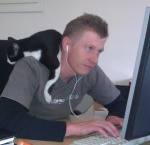 |
Chris is currently the lead software architect at Pinkmatter Solutions. Since 1994 he has been involved in designing and building network security and crypto appliances. In 2002 he co-founded the software development house Pinkmatter Solutions, a company specializing in interesting software, ranging from natural language processing to satellite imagery. He is currently involved with Paterva as the software architect of the information collection and visualization tool called Maltego. His spare time Chris spends with his now completely functional robotic girlfriend. |
| Barnaby Jack | |
 |
Barnaby Jack is a Research Architect with the TRACE research team at McAfee. Jack's role within TRACE involves researching new and emerging threats with a specific focus on embedded technology. Jack has over 10 years of experience in the security research space and previously held research positions at IOActive, Juniper Networks, eEye digital Security, and FoundStone. Over the course of his career, Jack has targeted everything from low-level Windows drivers to the exploitation of Automated Teller Machines. He has been credited with the discovery of numerous vulnerabilities, and has published multiple papers on new exploitation methods and techniques. Jack's work has been featured in many major media outlets including CNN, Forbes, MSNBC, Reuters and Wired. Jack has been an invited speaker at international security conferences in both the government and private sector including Black Hat, CanSecWest, IT-Defense and SysCan. Jack is often called upon for his opinions regarding the future of security research. |
| Matthew Jonkman | |
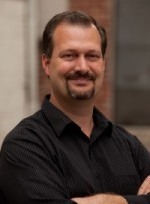 |
Matt is currently the President of the Open Information Security Foundation (OISF), a non-profit funded by the Department of Homeland Security (DHS) and industry partners to build a next-generation IDS/IPS engine. He is also the founder of Emerging Threats, formerly known as Bleeding Snort/Bleeding Threats. Emerging Threats is the only community-based IDS ruleset available supported by thousands of users and contributors. Matt's latest project is Emerging Threats Pro, a premium full coverage IDS ruleset focused on malware and the latest threats to network security. Matt spent five years in the Army as an Air Traffic Control RADAR and Communications Tech, attended ISU and the Rose-Hulman Institute, spent several years in Sprint Corporate Security, worked security in the financial industry for several large institutions, and has been consulting to fortune 500 organizations for over 10 years. Matt resides in Lafayette, Indiana. More information at http://www.openinfosecfoundation.org, http://www.emergingthreats.net, and http://www.emergingthreatspro.com |
| Roelof Temmingh | |
 |
Roelof Temmingh has been working in the security industry for the last 15 years. He started SensePost with some friends in 2000, left SensePost in 2007 and has been running Paterva ever since. He developed many successful security assessment tools, contributed to several books and spoke at numerous international security conferences (Black and Bluehat, Cansecwest, Defcon, FIRST, Ekoparty, RSA, HiTB, Ruxcon amongst others). Recently Roelof is mainly thinking about intelligence and information gathering, virtual identities and social botnets. He likes to create new and innovative technology and is the driving force behind Maltego. |
| Adam Laurie | |
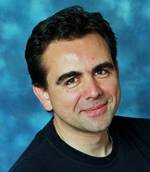 |
Adam has been working in the computer industry since the late seventies, starting in his family database software business as a programmer and then technical support engineer. In the eighties he went on to form his own data processing company, which became the largest such specialist company in Europe (A.L. Downloading Services), and then A.L. Digital Ltd., a systems integrator that was responsible for many industry firsts, such as the design and implementation of the first entirely computer controlled digital radio satellite service (Music Choice Europe) and the first Telecom and Financial Web Portals (Cellnet Genie and Scottish Widows). During this period A.L. Digital published the first Open Source secure webserver platform – Apache-SSL –which went on to become the de-facto standard with over 70% of the global market share.Adam's focus by this time was firmly on computer security, and he went on to discover multipleflaws in emerging consumer technologies, including the first Bluetooth vulnerability'BlueSnarfing', and many others in the fields of Bluetooth, InfraRED, Magnetic Stripes and, more recently, RFID. Over the past five years he has been a regular speaker (including several Keynotes) at international security conferences, such as DEFCON, BlackHat, CanSecWest, EuSecWest, ToorCon, SyScan, DeepSec, First Forsensic Forum, InfoSec, IT-Defense, and also for Police and Military at locations such as NPIA, CPNI, ACPO, West Point etc. |
| Volker Kozok | |
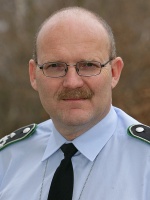 |
Lieutenant-Colonel Volker Kozok works in the German Federal Ministry of Defence as an official for the Commissioner for Data Protection in the German Armed Forces. For many years he held various positions as an IT Security Officer and oversaw the 11-month training of the Computer Emergency Response Team of the German Armed Forces as a training manager in 2001. As an IT Forensic Investigator and Security Analyst he focuses on reviewing and evaluating complex IT systems, on network analysis and on auditing. Based on his work for national and international teams on cyber security and his close ties to U.S. authorities, he dealt extensively with the issues of cyber security and cyber crime, focusing on risk management and analysis of network-based attacks. In addition to his work, he is a frequent speaker at specialist conferences and conducts awareness training courses in the German Armed Forces and external organizations. |



